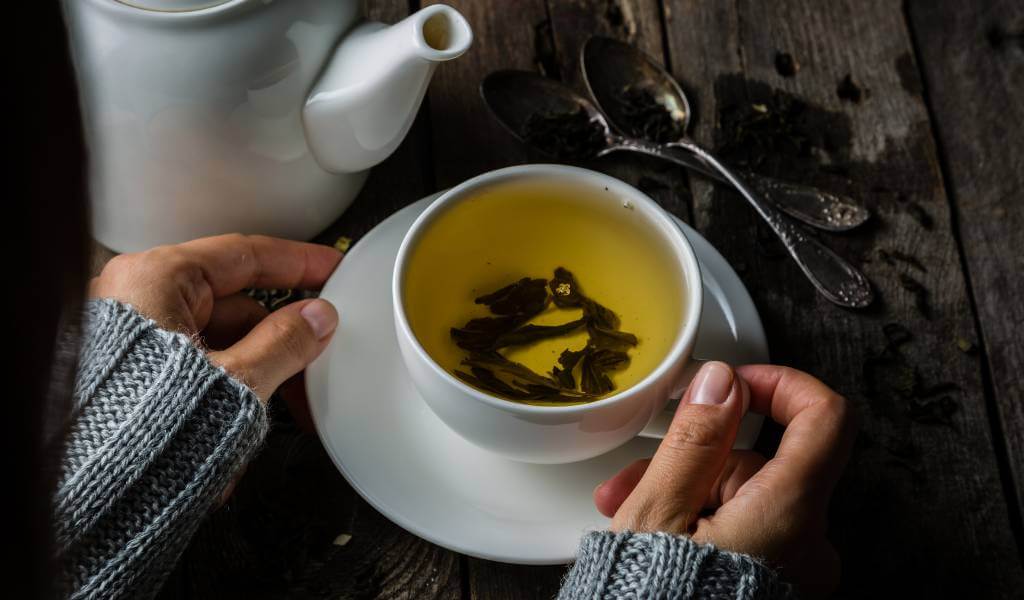Green tea leaves contain various compounds, nutrients, vitamins, and minerals, but these elements become highly diluted when steeped in water. As a result, the green tea you drink is primarily water with little to no macronutrient content.
However, the bioactive compounds inside provide numerous green tea benefits. The levels of these compounds are affected by the type of tea used, steeping time, and water temperature.
Many experts recommend people steep the tea in warm or ambient water for 2-3 minutes.
Green tea is also a moderate source of caffeine, with about a quarter of the amount found in coffee. Additionally, it contains polyphenols, a potent type of antioxidant.
Quotes of tea at Today
“All you need is tea, travel and a good book”
― Niamh Horne
What Are The Green Tea Benefits? Unlocking Its Powers
| Numbers | Benefits (Click to go) | Brief Explanations |
| 1 | Beneficial plant-based compounds |
Green tea is rich in antioxidants like EGCG, protecting cells from damage and reducing chronic disease risks.
|
| 2 | Improved cognitive function |
Green tea’s caffeine and L-theanine enhance brain function, memory, and mood.
|
| 3 | Boosts fat metabolism |
Green tea may increase calorie burning and fat reduction.
|
| 4 | Reduced cancer risk |
Green tea’s antioxidants may lower the risk of breast, prostate, and colorectal cancer.
|
| 5 | Maintains cognitive function with age |
Green tea’s catechins can protect against dementia and neurodegenerative diseases.
|
| 6 | Combats bad breath |
Green tea’s catechins inhibit oral bacteria, potentially reducing bad breath.
|
| 7 | May prevent type 2 diabetes |
Green tea compounds promote insulin sensitivity and regulate blood sugar.
|
| 8 | Protects against cardiovascular illness |
Green tea reduces cholesterol levels, improving heart health and lowering cardiovascular disease risk.
|
| 9 | Aids in weight loss |
Green tea boosts metabolism and fat burning, potentially aiding weight loss.
|
| 10 | May increase lifespan |
Green tea’s compounds may contribute to a longer lifespan.
|
| 11 | Fights inflammation |
Green tea’s EGCG possesses anti-inflammatory properties, benefiting skin health as well.
|
| 12 | Reduces stroke risk |
Regular green tea consumption is linked to a lower risk of stroke.
|
| 13 | Helps with Alzheimer’s disease |
CAGTE in green tea shows potential in protecting neuron cells from Alzheimer’s-related damage.
|
| 14 | Can handle genital warts |
Topical green tea extract can help treat genital warts.
|
| 15 | Decreases blood pressure |
Green tea’s antioxidants lower blood pressure, particularly in high-risk individuals.
|
It possesses beneficial plant-based compounds
Green tea is rich in antioxidants, which help protect cells from damage caused by free radicals. Free radicals are unstable molecules that can damage cells and contribute to aging and disease. The antioxidants in green tea can help prevent this damage and reduce the risk of chronic diseases.
But that’s not all – green tea also contains a particular type of polyphenol called epigallocatechin-3-gallate (EGCG), which acts as an antioxidant in the body. Antioxidants help protect our cells and molecules from damage caused by free radicals related to many diseases and aging.
Research has shown that EGCG is one of the most potent compounds in green tea and is responsible for many health benefits. Plus, green tea also contains some essential minerals that can help support good health.
Just choose a high-quality green tea brand to avoid excessive fluoride levels. But even if you can’t find the best brand, remember that the benefits of green tea still outweigh any potential risks. So enjoy a cup or two of green tea daily to boost healthy goodness!
SUMMARY: Green tea contains a high concentration of polyphenol antioxidants, particularly EGCG, a type of catechin. The presence of these antioxidants in green tea can potentially yield several positive health outcomes.
It may lead to improved cognitive function
The caffeine and other compounds in green tea can help improve cognitive function, memory, and mood. Some studies have shown that green tea may help reduce the risk of Alzheimer’s and Parkinson’s disease.
Caffeine affects the brain by blocking adenosine, an inhibitory neurotransmitter, which increases the neurons firing and neurotransmitters such as dopamine and norepinephrine.
But wait, there’s more brain-boosting goodness in green tea than just caffeine! Enter L-theanine, the amino acid that’s breaking barriers. L-theanine heightens the activity of the inhibitory neurotransmitter GABA, producing anti-anxiety effects, and boosts dopamine and alpha wave production in the brain.
Research shows that caffeine and L-theanine can have synergistic effects, meaning the combination of both compounds can have particularly potent outcomes in improving brain function.
The best green tea provides a milder and distinct buzz than coffee, thanks to L-theanine and a low caffeine dose. Many individuals report feeling more stable and productive when consuming green tea instead of coffee.
Several researchers have conducted studies on this topic, and their findings consistently indicate the brain-boosting effects of green tea’s compounds, such as caffeine and L-theanine.
SUMMARY: Although green tea contains less caffeine than coffee, it still has enough to produce an impact. In addition, it contains L-theanine, an amino acid that can work in conjunction with caffeine to enhance brain function synergistically.
Read More:
Boosts the fat metabolism
One ingredient frequently appearing in fat-burning supplements is green tea. In fact, scientific research suggests that green tea may enhance fat metabolism and boost metabolism.
For instance, in one study involving 10 healthy men, taking green tea extract led to a 4% increase in calories burned. And are fad diets that promise the world but deliver nothing to you? We have some happy news for you, though! Scientific research has shown that green tea extract increases fat burning by 17%. To see the benefits for yourself, give it a try right now!
Despite the potential green tea health benefits, it’s important to note that not all investigations demonstrate an enhancement in metabolism. The outcomes may vary based on the participant and the research design.
It’s also important to know that caffeine, which is found in green tea, can improve physical performance by releasing fatty acids from fat tissue and using them as an energy source. According to two separate review studies, caffeine may enhance physical performance by around 11–12%.
SUMMARY: While not all studies agree, green tea can improve metabolic rate and facilitate fat burning in the short term.
Antioxidants linked to reduced cancer risk
Research indicates that green tea consumption may help reduce the likelihood of developing breast, prostate, and colorectal cancer owing to its cancer-fighting properties.
Green tea is a fantastic source of powerful antioxidants. Numerous studies have connected green tea compounds with a reduced risk of various types of cancer:
- Breast cancer: A thorough review of observational studies has found that women who drink the greenest tea have a lower risk (around 20-30%) of developing breast cancer, one of the most common cancers among women.
- Prostate cancer: In one study, men who drank green tea had a reduced risk of advanced prostate cancer.
- Colorectal cancer: A meta-analysis of 29 studies found that green tea drinkers had a 42% lower chance of developing colorectal cancer (source).
Although some evidence suggests that green tea consumption may reduce the risk of cancer, further research is needed to confirm this association conclusively.
If you want to get the most health benefits of green tea, avoiding adding milk to your tea is best. The reason is some research suggests it can reduce the antioxidant value in certain types of green tea.
SUMMARY: Green tea contains potent antioxidants linked to potential cancer prevention. Several research studies have indicated that regular consumption of green tea is associated with a reduced risk of several types of cancer.
It may help maintain cognitive function as you age
Green tea may not only enhance brain function in the short term, but it also safeguards your brain as you age.
Alzheimer’s is a prevalent neurodegenerative condition that causes dementia in many older individuals. Likewise, Parkinson’s disease is another neurodegenerative ailment that results in the demise of dopamine-generating neurons in the brain.
Studies suggest that catechins in green tea may guard against neuron damage and reduce dementia risk.
SUMMARY: Green tea contains bioactive compounds that can provide multiple protective benefits for the brain, including a potential reduction in the risk of dementia. This prevalent neurodegenerative condition affects many older adults.
It may be effective in combating bad breath
Green tea has been shown to have antibacterial properties that can help prevent tooth decay and improve oral health.
One common bacterium in the mouth is Streptococcus mutants, which cause plaque formation and contribute to cavities and tooth decay. Research shows that the catechins in green tea can inhibit the growth of oral bacteria in the lab.
Despite ongoing research, it is unclear whether green tea has the same effects. Nonetheless, some evidence points to its potential to alleviate bad breath.
SUMMARY: Green tea contains catechins that could hinder the proliferation of bacteria inside the mouth, decreasing the likelihood of experiencing unpleasant breath.
May assist in staving off type 2 diabetes
Research indicates green tea’s compounds can promote insulin sensitivity and regulate blood sugar, potentially reducing type 2 diabetes risk.
Recent studies have shown that green tea could improve insulin sensitivity and reduce blood sugar levels. For example, a Japanese individual survey revealed that those who drank the greenest tea had a lower risk of type 2 diabetes by approximately 42%.
Furthermore, a review of seven studies involving 286,701 participants found that regular tea drinkers had an 18% lower risk of developing diabetes.
SUMMARY: Certain controlled studies have indicated that green tea could lead to slight decreases in blood sugar levels and a reduced risk of type 2 diabetes.
Might protect against cardiovascular illness
Some studies have shown that green tea may help reduce the risk of heart disease. Green tea contains compounds that help lower LDL cholesterol (the “bad” cholesterol) and triglycerides, which can help improve heart health.
As far as I know, green tea consumption may reduce cardiovascular disease risk factors, including high cholesterol levels. Cardiovascular diseases are less likely to occur suddenly thanks to their antioxidant content that prevents “bad” cholesterol metabolism.
Amazingly, people who drink green tea could have up to a 31% lower risk of dying from cardiovascular diseases, considering how simple and delicious it is to add green tea to our daily routine. So, why not give it a try? Your heart might just thank you for it!
SUMMARY: Studies have demonstrated that consumption of green tea can reduce both overall and LDL (commonly known as “bad”) cholesterol levels, in addition to guarding against the oxidation of LDL particles. Furthermore, individuals who consume green tea regularly have been shown to have a lower likelihood of developing cardiovascular disease.
It can aid in weight loss
Green tea has been shown to have a small but significant effect on weight loss. Green tea contains compounds that can help boost metabolism and increase fat burning.
Multiple studies indicate that green tea might help reduce body fat, especially in the belly area.
One of the studies that caught my attention was a 12-week randomized controlled trial with 240 people who had obesity. The participants who drank green tea experienced a significant reduction in body fat percentage, body weight, waist circumference, and belly fat compared to those in the control group.
However, it’s important to note that not all studies significantly increase weight loss with green tea. Further research is needed to confirm its effectiveness in aiding weight loss.
SUMMARY: Particular research suggests that consumption of green tea can result in an augmentation of weight loss, with a potential for noteworthy reduction of hazardous visceral fat, specifically.
Could increase your lifespan
Green tea has compounds that may safeguard us against cancer and heart disease. This means it might help us live longer. Researchers looked into this by studying 40,530 Japanese adults for 11 years.
The findings showed that drinking 5 or more cups of green tea daily lowered the risk of death during the study period. So, enjoying a cup of green tea could add some years to your life!
- Compared to men, women have a 23% lower risk of dying from any cause.
- Additionally, women have a 31% lower risk of heart disease and a 42% lower risk of dying from stroke.
- In contrast, men have a 12% lower risk of dying from any cause, a 22% lower risk of dying from heart disease, and a 35% lower risk of dying from stroke.
14,001 elderly Japanese sippers proved that those guzzling the most green tea had a 76% lower risk of death in a 6-year study.
SUMMARY: Research indicates that individuals who consume green tea could have a greater lifespan than those who do not.
Brewing Up Relief: How Green Tea Fights Inflammation
I learned that green tea contains anti-inflammatory properties based on human clinical studies and experiments on cells and animals. Its primary component, epigallocatechin-3-gallate (EGCG), has also been found to have anti-inflammatory effects. A review of these studies demonstrated these effects quite nicely.
Furthermore, I discovered a 2019 analysis that showed how tea extracts can be used in cosmetics to promote anti-inflammatory responses when applied topically. According to the researchers, solutions containing tea extracts can also improve skin microcirculation in affected areas.
SUMMARY: Green tea contains anti-inflammatory properties due to its primary component, EGCG. Human clinical studies and experiments on cells and animals have shown its anti-inflammatory effects. Tea extracts can also be used in cosmetics to promote anti-inflammatory responses and improve skin microcirculation in affected areas.
Reduce Your Stroke Risk
According to research, drinking and making green tea (how to make green tea) regularly appears to be linked to a lower risk of stroke. The American Heart Association (AHA) conducted a study that adding green tea to your daily diet could significantly reduce stroke risk.
It Helps For Alzheimer’s disease
Now, want to know about green tea’s secret weapon against Alzheimer’s? Scientists in 2011 studied the colon-available green tea extract (CAGTE) on crucial brain proteins using neuron cells as a test-tube model.
Can green tea protect cells from damage? That’s what we tested by studying CAGTE, the good stuff in green tea that sticks around after digestion. Indeed, it fights off free radicals and beta-amyloid peptides. These compounds are believed to contribute to the development of Alzheimer’s disease.
The study showed that CAGTE could protect the cells from damage caused by these harmful compounds at high concentration levels. However, it’s important to note that the concentration in the experiments was much more significant than naturally found in the human body.
SUMMARY: The study found that CAGTE could protect neuron cells from damage caused by free radicals and beta-amyloid peptides at high concentration levels. However, the concentration in the experiments was much higher than naturally found in the human body.
It Can Handle The Genital Wart
The FDA has approved a topical treatment made from green tea extract to tackle outbreaks of genital warts. It’s worth noting that this ointment is only available via prescription, and its effectiveness for patients can range from 24% to 60%.
Can Decrease Blood Pressure
Many experts claim that potential green tea benefits are for heart health, such as reducing cholesterol levels and lowering blood pressure. According to a 2020 analysis of 1,697 people published in Medicine, green tea consumption significantly decreased blood pressure, especially in individuals with high blood pressure and a greater risk of cardiovascular disease.
CDC warns that high blood pressure damages arteries, leading to dangerous plaque buildup and narrowed blood flow to the heart and brain. When left untreated, high blood pressure can also result in kidney failure.
Green tea’s power to lower blood pressure lies in its potent antioxidants, which ease inflammation, widen blood vessels, and boost blood flow. However, most studies analyzed in the 2020 study only lasted between three and sixteen weeks, and it is unclear whether drinking green tea for longer periods (best time to drink green tea) can improve blood pressure levels.
SUMMARY: Green tea has potential heart health benefits, such as lowering cholesterol and blood pressure. A 2020 analysis of 1,697 people found that it significantly reduced blood pressure, likely due to its antioxidants that widen blood vessels and reduce inflammation. Accordingly, the long-term green tea consumption effects on blood pressure still need to be clarified, as most studies were short-term.
Keep Your Bone Health In Safety
Drinking green tea could help prevent the loss of bone mass, especially in postmenopausal women at a greater risk of developing osteoporosis. In postmenopausal Korean women, green tea preserves bones!
Nutrients published a study in 2022 including 6,500 females who drank three glasses per day. Results? Compared to non-drinkers or people who drank less than one cup per day for a year, there was reduced bone mass loss in the spine and thigh.
When bone mass reduces, osteoporosis can increase the chances of osteoporosis, leading to fragile bones and hip, spine, or wrist fractures. According to the National Library of Medicine, postmenopausal women are more susceptible to this condition.
The high antioxidant concentration in green tea can help prevent bone loss and promote bone formation. This may explain why a 2017 analysis published in Medicine linked tea consumption to reduced osteoporosis.
SUMMARY: Drinking green tea can prevent bone loss and reduce osteoporosis in postmenopausal women, as shown by a study in Nutrients. Green tea’s antioxidants can help promote bone formation, according to a 2017 analysis in Medicine.
The Hidden Risks of Drinking Green Tea: What You Need to Know
As an adult who enjoys drinking green tea, I’ve found that it generally doesn’t cause any side effects. However, I want to be aware of its potential risks and complications.
- Firstly, drinking green tea might not be a good idea if you’re very sensitive to caffeine. It could lead to problems like insomnia, anxiety, irritability, nausea, or an upset stomach.
- Secondly, I’ve read that high concentrations of green tea extract could harm the liver in rare cases. However, most research indicates that these instances are idiosyncratic reactions and are not directly caused by green tea.
- Thirdly, combining green tea with other stimulants like drugs could increase blood pressure and heart rate.
It’s important to note that green tea supplements aren’t regulated by the FDA, which means they may contain substances that are unsafe or have unproven benefits. I recommend checking with a doctor before starting any herb or supplement regimen.
Key Things To Consider For Consuming Green Tea
When it comes to enjoying my green tea, whether hot or chilled, I always keep a few things in mind:
- I like to buy naturally decaffeinated green tea because a cup of regular green tea contains between 20 and 50 milligrams of caffeine. This may not be ideal for those who are sensitive to caffeine, as it can cause anxiety, a fast heart rate, and jitters, according to the Food and Drug Administration (FDA). However, removing the caffeine may lower the antioxidant content, as stated in a 2016 Food Chem article, though research on this topic is mixed.
- When I sweeten my green tea, I will be mindful of the amount of sweetener I add. The American Heart Association (AHA) recommends that women consume six teaspoons of added sugar daily and men no more than nine teaspoons. Too much sugar can lead to weight gain, type 2 diabetes, and heart disease.
- Finally, I like to get creative with my green tea! While I enjoy drinking it independently, I also use it in smoothies, oatmeal, or boiling rice and steaming vegetables. There are so many ways to enjoy this tasty and healthy beverage!
Frequently Asked Questions
Is it okay to consume fruits with green tea before a workout?
I love drinking healthy beverages like fruits and green tea, and it’s great that they can be enjoyed together without any problems. But to take my pre-workout routine to the next level, I should eat fast-digesting carbs like fruits. It will refuel my body and give me the energy boost to crush my workout.
Would it be fine to have snacks after drinking green tea?
Absolutely! It’s excellent to enjoy a snack after sipping on some green tea. Yet, since green tea has a lot of caffeine, it’s a good idea to steer clear of sugary or carb-heavy foods while snacking.
Can Ashokarishta be taken with green tea?
Some people are unsure if it’s okay to have green tea and Ashokarishta simultaneously. The main reason is they have different effects on the body. Don’t worry; having both together has no major side effects. Yet, if you have any concerns about taking specific supplements, it’s always a good idea to talk to your doctor first.
Does green tea hinder mental alertness?
Drinking green tea can prevent grogginess upon waking up. This refers to the natural process of becoming more alert and aware of your surroundings each morning. Various studies have suggested that people who consume green tea regularly are less prone to experiencing sleep-related issues and are more mentally sharp during the day.
Is it safe to have green tea on an empty stomach along with sprouts in the morning?
Most foods pair well with sprouts but consider green tea. It’s usually safe to consume, but on an empty stomach in the morning, it can cause bloating and gastric discomfort due to its high caffeine content. If you’re unsure whether to eat sprouts before drinking green tea in the morning, it’s best to consult your doctor first.
Can green tea be paired with a grilled vegetable sandwich?
Absolutely! You can have a delicious green tea sandwich with grilled veggies. Just sprinkle chopped bell peppers or mushrooms on your green tea before grilling, and you’ll get a fantastic flavor boost, added nutrients, and antioxidants. Give it a try!
Is it okay to eat meat and eggs after having green tea?
In theory, it’s possible to eat eggs after drinking green tea. But most folks wouldn’t find it very tasty or satisfying. Plus, eggs have a lot of cholesterol and other not-so-healthy stuff that you should avoid if you’re trying to get healthier.
Can green tea be beneficial for treating fungal ear infections?
Although there isn’t much scientific proof to back up the effectiveness of green tea in treating fungal ear infections, many people think it could help.
What are the benefits of drinking green tea with lemon?
Yes, green tea with lemon is good for you. The lemon juice helps activate the tea’s polyphenols, which are antioxidants that can help protect your body from damage. Additionally, lemon juice is a good source of vitamin C, which can help to boost your immune system.
To Sum Up
Green tea is a beloved beverage in various cultures. There are many green tea benefits that you should consider., such as safeguarding our brain, heart, and bones.
However, it may pose health hazards for people taking particular medications or with caffeine intolerance (how much caffeine in green tea). If you’re not a regular green tea drinker and unsure if it suits you, don’t hesitate to seek advice from your healthcare provider or dietitian. They can help you understand how green tea might affect your health objectives.
Please support my work by upvoting this article, commenting below, and sharing it with your friends. Thank you from the bottom of my heart!
I’m Shanna, creator of Spiritea Drinks. I’m all about teaching people to grow their own food, tea, cook what they harvest, and eat with the seasons.








